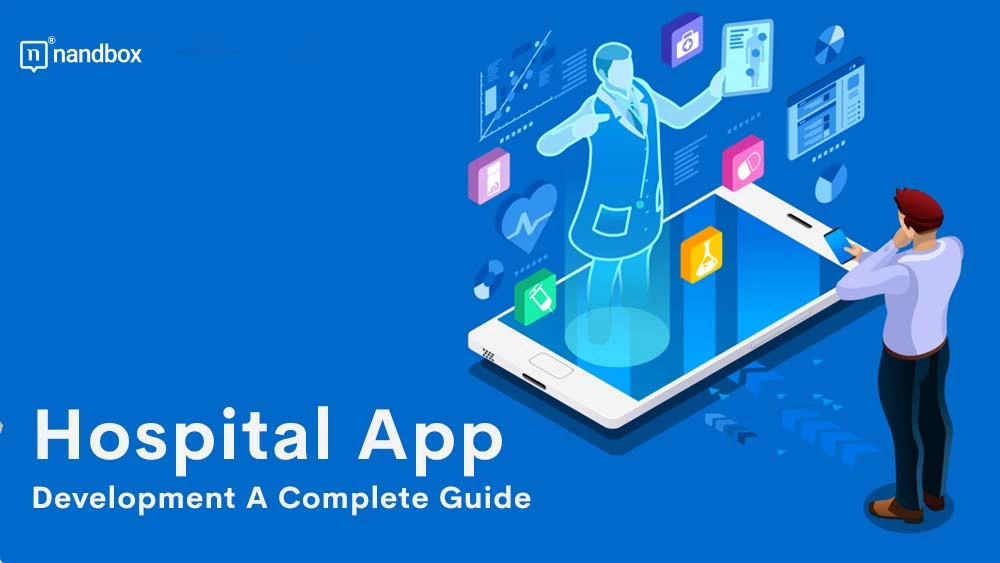Hospital App Development: A Complete Guide
With application development on demand, everyone is turning their heads towards getting their business to the top. That is by creating an app for their business. Healthcare industries like hospitals should have applications to make everything easier for their patients and medical crew. In this age of digital transformation, a hospital's efficiency can be based on whether or not it has a patient app. With this new technology, your healthcare facility can keep the same level of satisfaction with its facilities. That can happen while also making patients happier, reducing wait times, and keeping better track of diseases. The impact of COVID-19 on hospitals was huge and led people to think of alternative ways of dealing with patients. That is without the need to have face-to-face contact. In this article, we’ll discuss the importance of hospital app development in a comprehensive manner.
COVID-19's Effect on Hospital Applications
The market for hospital apps has been spurred by the global pandemic. People have worried about their health constantly since the beginning, and this attitude has not changed. COVID-19 has pushed the development of hospital solutions by, among other things, creating the necessity for remote working arrangements and distance care.
IoT, AI, blockchain, big data, and analytics should all be present in today's medical solutions, and they should be cloud-based. With all of these requirements, the hospital app becomes a full solution that handles all of the most important tasks in a medical organization. The exact areas of use here are database management, remote monitoring, experience customization, care management, and the use of wearable technology.
Hospital App Development Steps
Developing an app will require a set of steps from you. Simply follow the following steps to our complete hospital app development guide, and we guarantee you that you’ll be able to develop your own app with ease and without any hassle.
Choose the Right App Platform
Before you begin development, it is important that you choose the right app platform for your hospital. Will your app be web-based or mobile-based? Are you targeting one particular operating system (iOS, Android, etc.), or will your app be compatible with multiple systems? Figuring out which platform to use beforehand can save you a lot of time and money in the long run. There are different types of apps; some are native, others are hybrid, and others are web-based. You can read our article about the difference between each of them on our blog.
Develop a Clear Project Scope and Requirements
Before you begin development, it is important to have a clear idea of the project scope and specific requirements. Write down an exhaustive list of features and functionalities you want your hospital app to have, as well as the timeline for completion. Additionally, make sure that the development team understands how different elements within the app need to interact with one another—for example, how will user data be stored and used? These are all critical questions to answer before embarking on any meaningful development process.
Create the Mobile App's User Interface and User Experience Design

After identifying your app's objectives and gathering the process requirements, it's time to focus on the user interface and experience design. This involves creating a visual concept for your mobile app and designing user-friendly navigation paths that will provide users with quick access to all of the features and functions you identified during the planning stage. During this step, you should also create interactive mockups for the different screens of your app that allow users to test out how each part of the app works before you commit to writing code.
Choose Third-Party Integrations to Enhance Functionality
To ensure that your hospital app meets user needs and preferences, you may want to consider integrating third-party services. This step can provide users with access to additional features without having to develop them themselves. Some examples of third-party integrations are scheduling tools like Calendly. Payment processing systems like Stripe. Also monitoring services for patient care like CareKit. Before proceeding with any type of integration, make sure you thoroughly evaluate the service.
Benefits of Hospital App Development
From monitoring patients remotely to a general improvement in hospital efficiency, developing a hospital app has many advantages. We’ll list them for you and make sure you get an overview of how beneficial developing a hospital app could be.
Facilitate Health Care Management by Leveraging User Data
Health professionals can easily fill out and manage patient medical records due to the availability of a central database. Electronic data improves the efficiency and effectiveness of the hospital as a whole while reducing the amount of paperwork that is made every day. In return, patients can expect more accurate diagnoses because the data is carefully entered and saved in the app's software. This is one reason why making hospital apps should be prioritized in 2023.
Monitor Patients Remotely

An app will allow health professionals to get the help they need in monitoring their patients without having to interrupt their daily lives. Hospital app development simply facilitates this process. Even from patients' homes, businesses, and schools, medical professionals are able to reach them. Their patients’ daily life can be continued while receiving immediate remote medical assistance. In order to provide healthcare services, doctors can now do so without spending time or money traveling to patients' locations thanks to the growing need for virtual hospital software, and vice versa with the patients.
Increase Efficiency in Scheduling Appointments and Billing

A hospital app can help streamline the process of scheduling appointments and billing. With the app, patients can easily view available time slots for visits, select a preferred time and confirm the appointment. It allows them to also check their billing statements in real-time and make payments without having to wait for paper bills or physically visit the reception desk. This makes it more convenient for both doctors and patients to book, manage and measure appointments.
Open Access to Medical Resources and Advice
Hospital apps often provide access to medical resources and advice for both doctors and patients. This includes knowledgeable articles and videos on health topics that can further improve everyone’s understanding. Moreover, this open access to relevant medical information creates an avenue for self-care and better health management in the long term. Patients can also use the app to track their own medical records, such as immunization dates or recommended dosage of medication.
Hospital App Development With nandbox’s App Builder
No-code app development platforms have made it easier for app developers to simply create a flawless app in no time. nandbox unlike any other app builder provides you with native applications. This means that applications you develop on nandbox can be used on both Android and Apple’s iOS systems. With a simple app builder interface and a simple drag-and-drop feature-adding method, our app builder is the easiest to navigate. You will also have access to the nandbox’s documentation section. A complete guide to our app builder with detailed steps on how to get things done during your app-building journey. Sign up now for nandbox’s app builder and enjoy our 14-day free trial!
